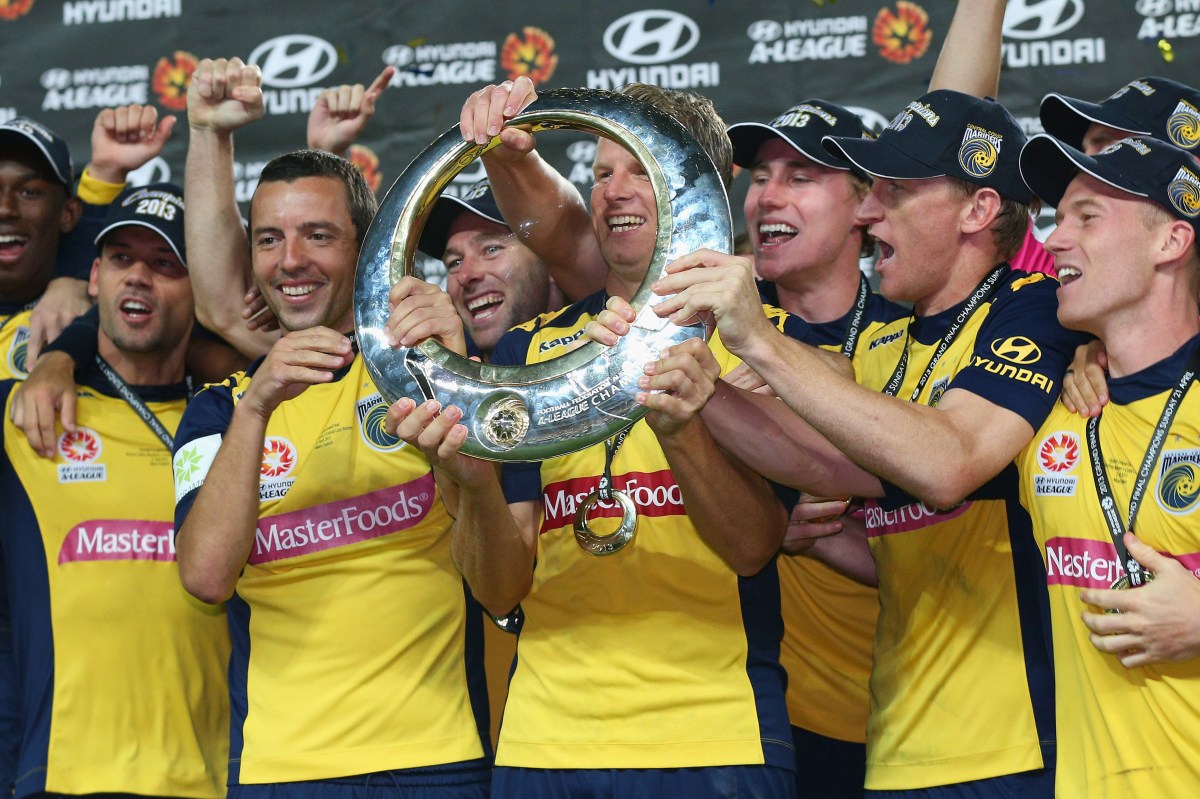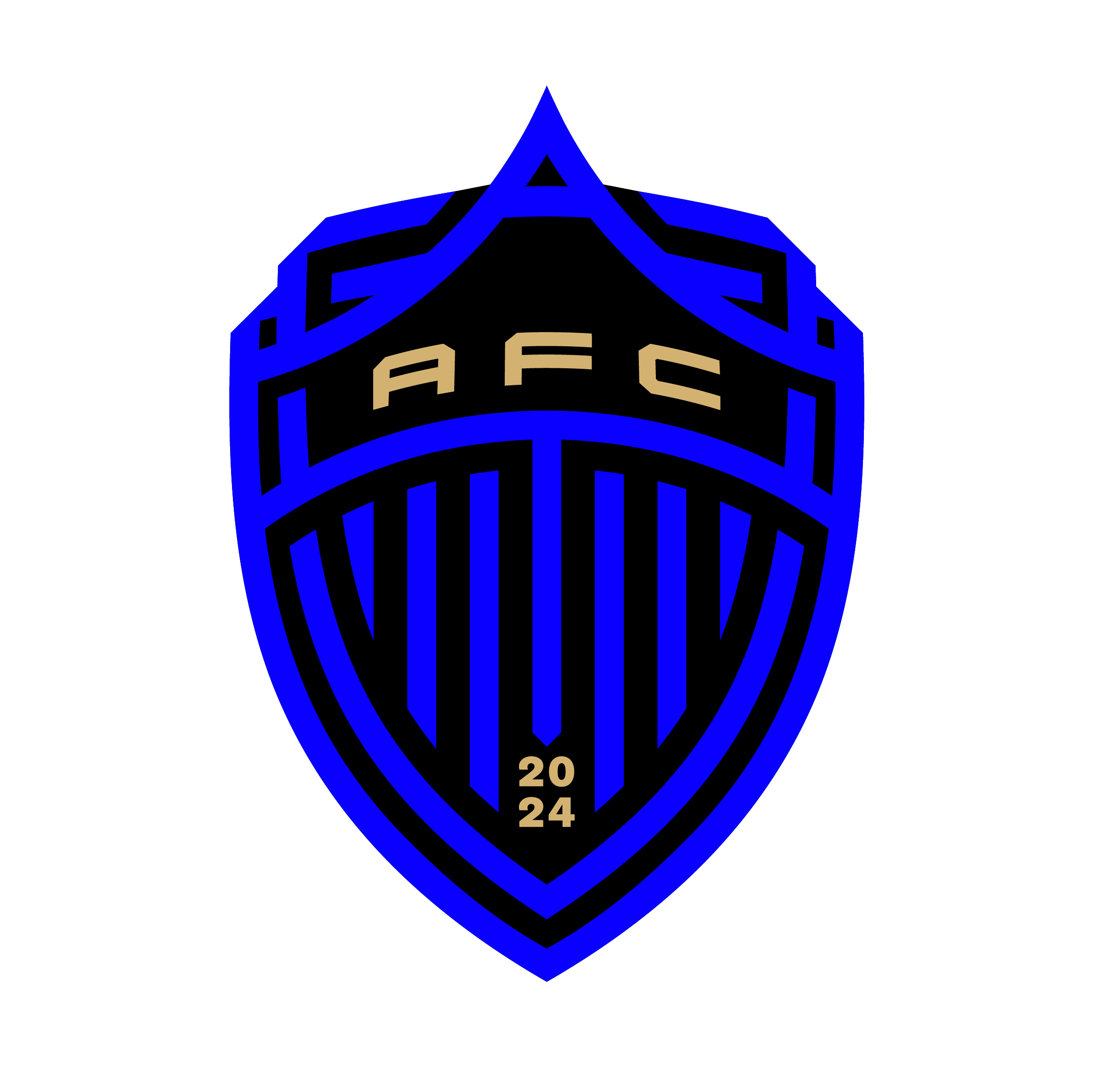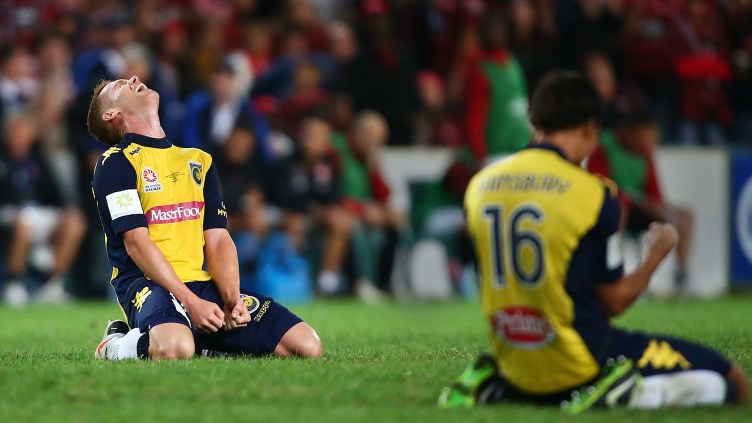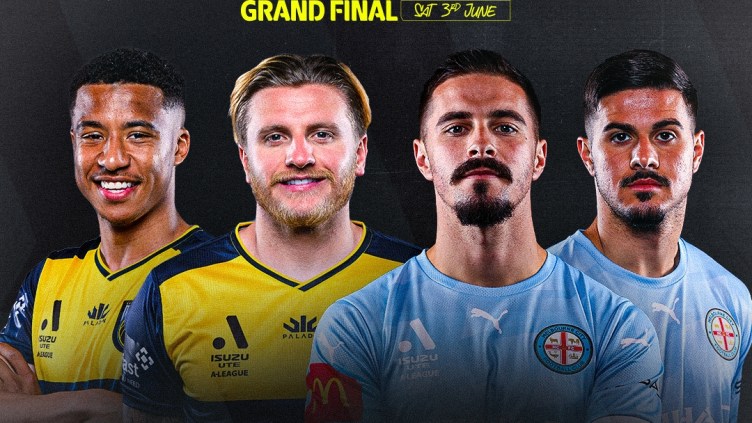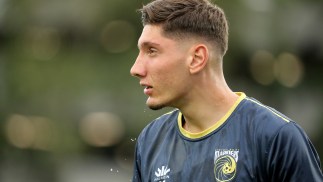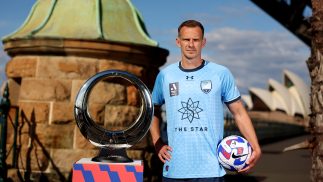The last time Central Coast got to a Grand Final, 10 years ago, the club was threatening to implode completely off the pitch. Tom Smithies speaks to some of those involved.
You could call it a tale of two tables, and both of them tell part of the story of how one of Australia’s greatest sporting triumphs so nearly became one of Australia’s most infamous implosions.
A decade after the Mariners’ last Grand Final, and with the club finally back in the season showpiece, this is the story of how that team bonded over financial crises and threadbare facilities to produce a triumph against every odd.
Table one is the A-League ladder, which in the first weeks of 2013 showed the Mariners comfortably in the lead in first place thanks to the assured progress of a team based on an experienced core and an array of exciting young Australian talent.
Table two sits in the bar of the Terrigal Hotel on the Central Coast of NSW, and was where Graham Arnold put down a round of drinks for several of those experienced players – the leadership group of that Mariners team, to which on a January Sunday in 2013 he was about to break the news of the club’s calamitous finances.
The Mariners had effectively run out of money, with more than three months of the season to play. On the field, the players felt confident they were on the way to winning silverware. Off it, there were barely any gold coins left even in the petty cash.
BUY TICKETS TO THE GRAND FINAL
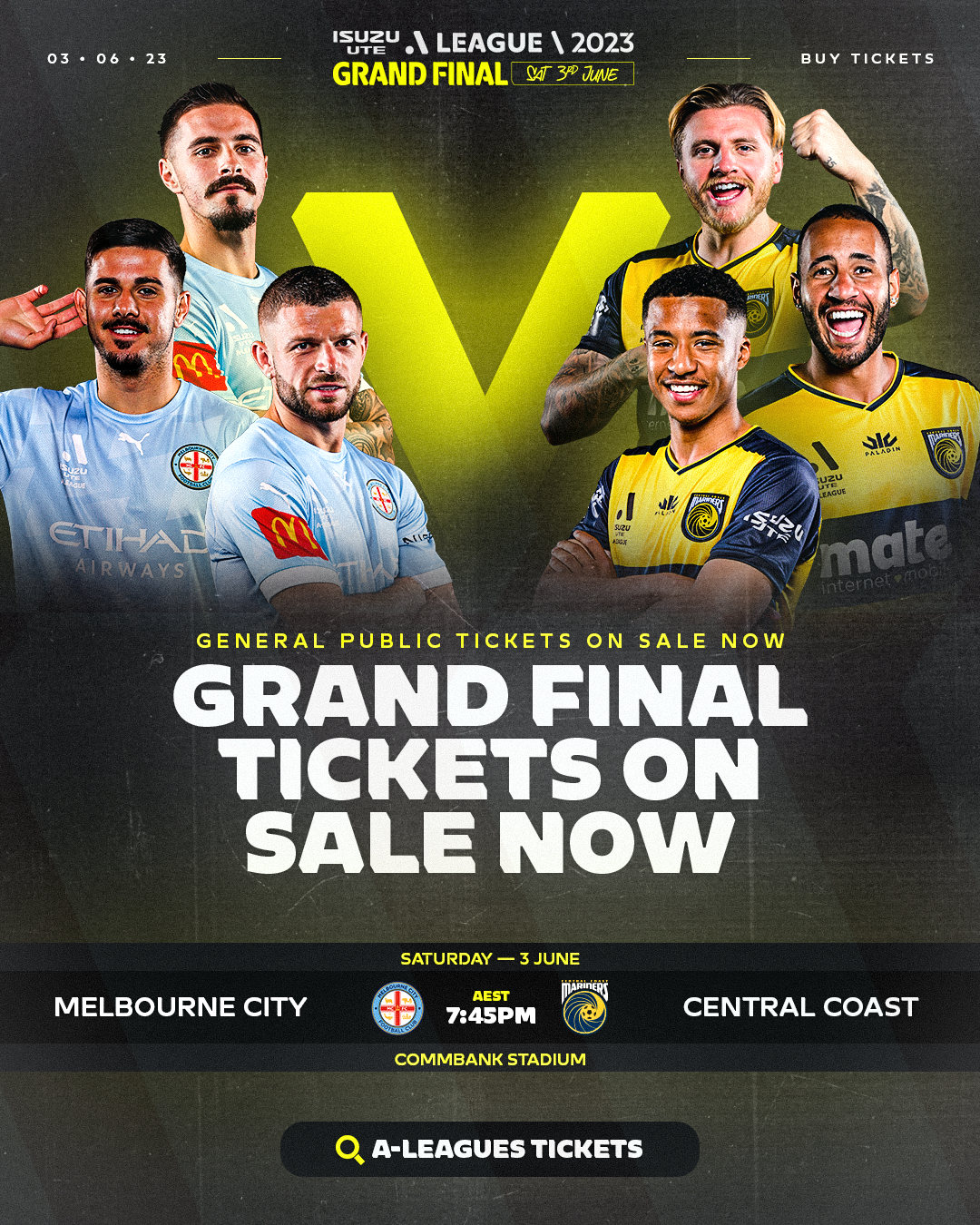
What unfolded over subsequent weeks was a saga of solidarity that would be impossible to recreate artificially. The funny thing is that so many of those involved look back on what in sporting terms was a near-death experience with genuine warmth. When you’re in the trenches together and survive, it breeds an esprit de corps like little else.
By the evening of April 21 that year, those Mariners players were drinking beer again but this time with a chaser of euphoria as they sat in the dressing room at Allianz Stadium and celebrated the club’s first championship in its fourth Grand Final.
Within weeks that group of players and coaches would start breaking up, and the precipitous decline of the Mariners into a decade of mediocrity had begun. It’s taken until now to reverse that, as the club prepares for its first Grand Final since 2013 on Saturday night.
Many of the players from that previous iteration have enjoyed reminiscing in recent days about how they triumphed against the odds, but it’s striking how even now it’s only when they spell out the events of that time that they start to remember how long those odds were.
***
The Mariners were always a slightly anomalous inclusion in the A-League Men when it began. The region was a uniquely discrete area to have no elite sports team, it’s true, but also carried a population of only a few hundred thousand and had a heavy reliance on seasonal tourism.
In the early days the club thrived on its community engagement, but from 2007 began to have rather more ambitious goals. Property businessman Peter Turnbull, a foundation shareholder of Sydney FC, bought a majority stake in the Mariners that year, and began to draw up plans to make his new club self-sufficient.
In 2010 the club’s owners – Turnbull, founding chairman Lyall Gorman and English businessman Mike Charlesworth – bought a parcel of land at Tuggerah on the Central Coast from a local RSL club for $7.5m with $4.5m paid upfront.
The plan was to build a Centre of Excellence for the club to train at and develop the land around it, with the club then living off the income from a mooted hotel, office block and retail units. The whole complex was slated to cost $40m, and the Federal Government promised $10m for its community benefits.

With hindsight, executing such a deal as the after-effects of the global financial crisis continued to hit property investments globally was awful timing. Turnbull’s own business had been badly affected and he was effectively running the club as well with Charlesworth based in the UK and Gorman by then chairman of the Wanderers and looking to sell his stake in the Mariners.
“They were tough days,” Turnbull tells KEEPUP with admirable understatement now. “It was always hard to run one of Australia’s best sporting teams on a limited budget and things were becoming untenable.
“The Centre of Excellence was designed to bring in new revenue streams but we just couldn’t hang on long enough. The effects of the GFC went on for a long time, and the other problem with football investment is it’s not just taking your money, it’s also a massive distraction.
“Football’s fun, and if I’ve got to choose whether to take a phone call from the bank or one from Graham Arnold, of course I’m going to pick up the call from Arnie, aren’t I!”
Reports of potential new investment appeared regularly; the club itself trumpeted meetings with separate Asian groups, while Russian investors with links to Spartak Moscow apparently held talks with Turnbull for months. Perhaps unkindly, their financial bona fides were first called into question when their representatives arrived at a game in a heavily dented Mazda 3.
BALARD: A ‘crazy’ journey through four countries to Gosford
CUMMINGS: The full story of how Jason Cummings turned his career around in Australia
NEIL WARNOCK ON MONTY: The ‘biggest heart’ and ‘a manager’s dream’ who was always destined to coach
All the while, debts were escalating. The Australian Tax Office was owed a six-figure sum, while builders downed tools on the Centre of Excellence site over outstanding progress payments; the remaining $3m on the land purchase was due as well. In 2012, the players had twice been paid late, and at the January 2013 meeting at the Terrigal Hotel, Arnold revealed the salaries would be late again – with no firm promise of when they would be paid.
Various contingency plans were put in place to protect the younger members of the squad: several of them lived together in one apartment, and Arnold volunteered to pay the rent on it in the short term. Captain Nick Montgomery, in his first season with the club, loaned several players money, while vice-captain Patrick Zwaanswijk and other players agreed to defer their wages to allow the younger players to be paid first.
The news spread quickly. At The Daily Telegraph, this reporter took a call from a woman who identified herself only as the wife of one of the players, asking desperately if there was news of when the salaries would be paid as her children’s school fees were outstanding.
Suddenly there was short-term relief. After a year of sparkling performances for the Mariners, young playmaker Tom Rogic had caught Celtic’s eye and in the middle of January a deal for around $600,000 was completed.
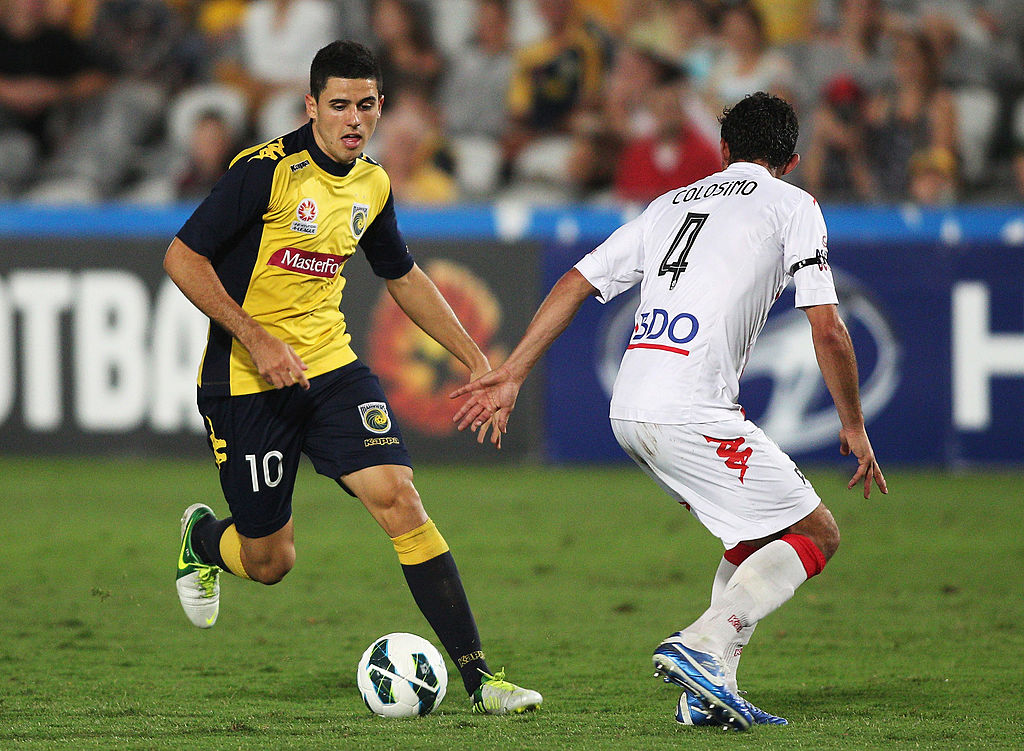
By March, though, it was drying up again. On the field, the team had slipped to second place behind the Wanderers but were on their way to the Grand Final – that they were achieving anything at all was little short of a miracle.
***
When you turn off the highway now into the site at Tuggerah, it’s a hive of activity – there’s a five-a-side complex, an office block with cafe, an aquatic centre and myriad other businesses. By March 2013 though there was little beyond the club’s Centre of Excellence and a carpark; and any title of excellence hardly held up to close scrutiny.
Effectively there was one pitch for the team to train on, one end of which was waterlogged and unplayable, plus a few huts to act as changing rooms and gym. A Mariners-supporting green keeper from the local golf course was helping to maintain the pitch as a favour, but Arnold had to pay for the petrol for his lawnmower.
To try to cheer things up the players converted one hut into a lunch room, complete with TV; the following weekend, someone broke in and stole the TV.
“We were allowed to train once a week at the Central Coast Stadium, but no more than that because apparently it cost $500 each time,” Zwaanswijk recalls now with a laugh. “So most days we were training on a pitch about 60m long, and some days we had to do the pitch markings ourselves.
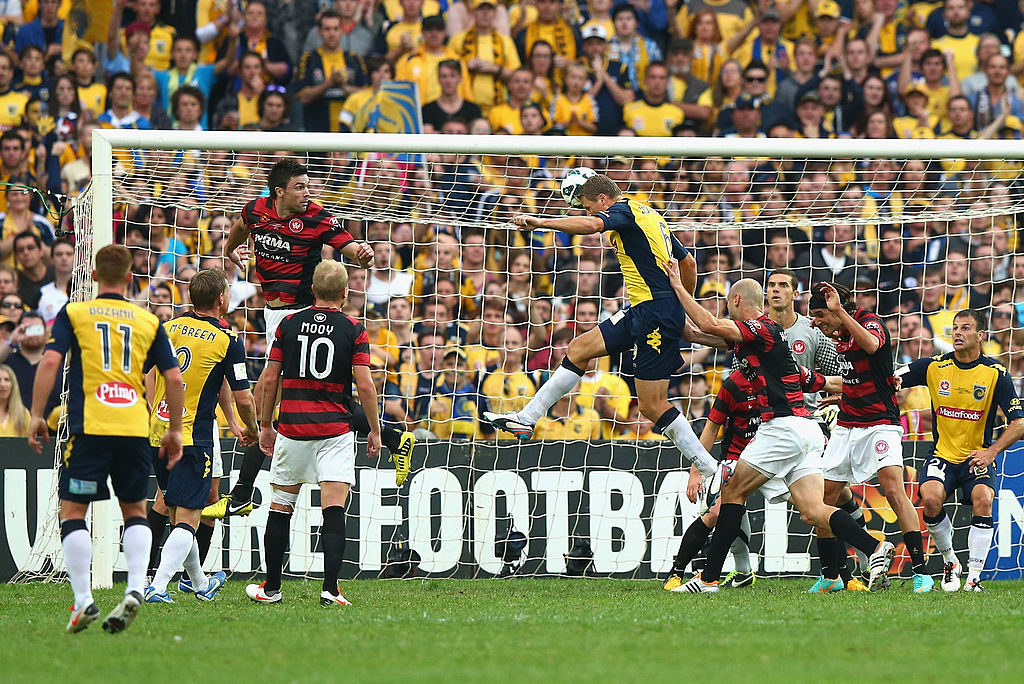
‘We had a volunteer family cooking us lunch each day, and they made us banana bread every Friday as a treat! But the funny thing is that in some ways this all made us stronger.
“Arnie was supporting and protecting us as best he could from what was going on with the club and that meant we could focus on our football. It was almost the glue that brought us together.
“The whole situation just created this vibe… it was a unique situation.”
Arnold recalls the day before his side was to play Sydney FC away in March 2013; having trained at the stadium, the players and coaching staff were eating lukewarm pasta out of tupperware containers while waiting for the team bus to travel to Sydney.
In the ultimate piece of meteorological symbolism, it started to rain, forcing the players to huddle under the bridge that rises past the stadium.
“Yeah, we had some pretty tough times but there were also some great people around the club who did things voluntarily that helped us get through it,” Arnold says.
“That day I remember everyone was sitting on the curb underneath the bridge, eating lunch with a plastic fork.
“That wouldn’t happen these days but we just had to get on with it, use it as motivation – no other team in the country would be getting treated that way, no one expects us to do anything because we’re the poorest club, the smallest club, but let’s go out and use that against all the clubs with all the big money.”
Zwaanswijk, a veteran of European football, explains why it was such a “unique situation” despite the stresses. “Arnie liked us all to live around Terrigal, so after training you’d walk into town and bump into each other at the beach, it creates a good bond,” he said. “We became very good friends, and we got a lot of local support – you’d walk into a cafe and get your coffee paid for because you were a Mariner.
“I guess we were local heroes in a small way, we brought a lot of pride to the area. We scored a lot of goals and we were pretty entertaining that season; as players I think we were quite approachable. It was all pretty special.”
***
When the March salaries weren’t paid, though, things came to a head. The players discussed strike action, just as the regular season was coming to a crescendo. Due to play Adelaide in the penultimate round of the season, some of the players spoke to the United squad to discuss a combined show of protest at the start of the game, until the players association advised that it could put them in breach of contract.
Finally, on March 25, Turnbull, Charlesworth and Gorman agreed a new ownership structure whereby Charlesworth became the majority owner, Gorman walked away and Turnbull was left with a minority share worth effectively nothing.
Charlesworth immediately settled the most pressing bills, including the Tax Office sum. Addressing the squad by speakerphone from the UK, he told them he had transferred the money to pay them immediately. Turnbull stayed on as chairman but left the club completely a few months later, having by his own estimation lost several million dollars.
“The A-League had been part of my family’s life since 2005 so to walk away with effectively nothing left a pretty sour taste,” he says. “The one good thing was that it allowed me to get back to my primary business and build that back up.
“Of course you miss the involvement, but I learnt that there’s no middle ground with football fans. I remember there were two threads about me on the Mariners forum online; one was titled Turnbull Out, the other was calling for a statue of me to be put up outside the stadium!”
Less than a month after Charlesworth took control, the Mariners beat Western Sydney at Allianz Stadium to secure their first A-League Men Championship. Fittingly it was Zwaanswijk and Daniel McBreen, two of the leadership group, who scored the goals, and several days of partying began.
Now the club has ended a decade of failure by getting to this year’s Grand Final, sparking memories up and down the Central Coast.
“I was talking to my wife about that time the other day, reading all the articles about the 10 years since,” says Turnbull. “You’d think there’d be an overriding sense of bitterness from how it played out, but it’s not at all.
“My wife was saying what fun it all was. It was crazy, but it was fun.”
